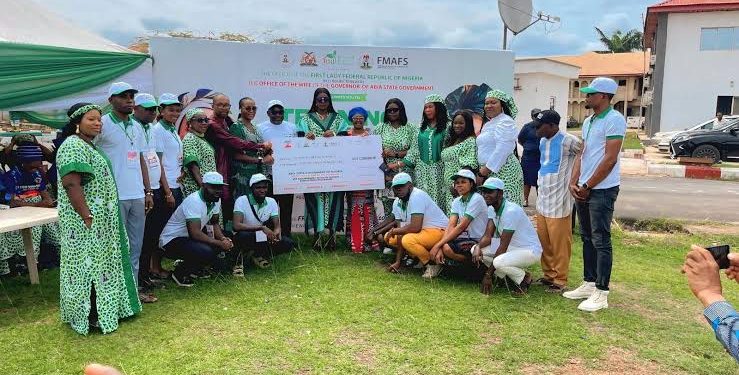More than 120 young people in Abia State have received start-up kits and N12 million in grants to launch agribusiness ventures after completing hands-on training in sustainable farming. The programme covered areas such as organic fertiliser production, animal feed formulation, pest control, and farm safety.
The empowerment initiative, which was backed by the Federal Ministry of Agriculture and the office of the Abia First Lady, seeks to address youth unemployment and strengthen Nigeria’s food system by building a new generation of skilled agripreneurs. By focusing on practical knowledge and eco-friendly practices, the training aimed to prepare participants to run profitable and resilient agribusinesses.
Representing Nigeria’s First Lady, the wife of the Abia State Governor, Priscilla Otti, described the programme as a catalyst for long-term change. She encouraged the beneficiaries to take ownership of their role in driving food security, boosting local economies, and contributing to national development. She emphasized the importance of youth-led agriculture in transforming rural communities and building a self-sustaining future.
Abia State’s Commissioner for Youth Development, Nwaobilor Ananaba, commended the initiative as timely and strategic. He noted that reviving agriculture through youth participation would help shift Nigeria’s focus from oil dependency to sustainable economic alternatives. According to him, the future of food production and employment lies in the hands of young, innovative minds willing to explore modern farming techniques and agribusiness opportunities.
Beneficiaries of the programme expressed excitement about the opportunity, describing it as a turning point in their lives. Many said the training opened their eyes to the profitability of agriculture when backed by the right tools and knowledge. They pledged to use the grants and resources wisely to build sustainable ventures and inspire other young people to see agriculture as a viable career path.
The initiative adds to a growing number of grassroots efforts aimed at revitalizing agriculture in Nigeria and creating economic pathways for youth across the country. It also aligns with broader national goals of achieving food self-sufficiency, reducing unemployment, and promoting inclusive development through youth empowerment.










